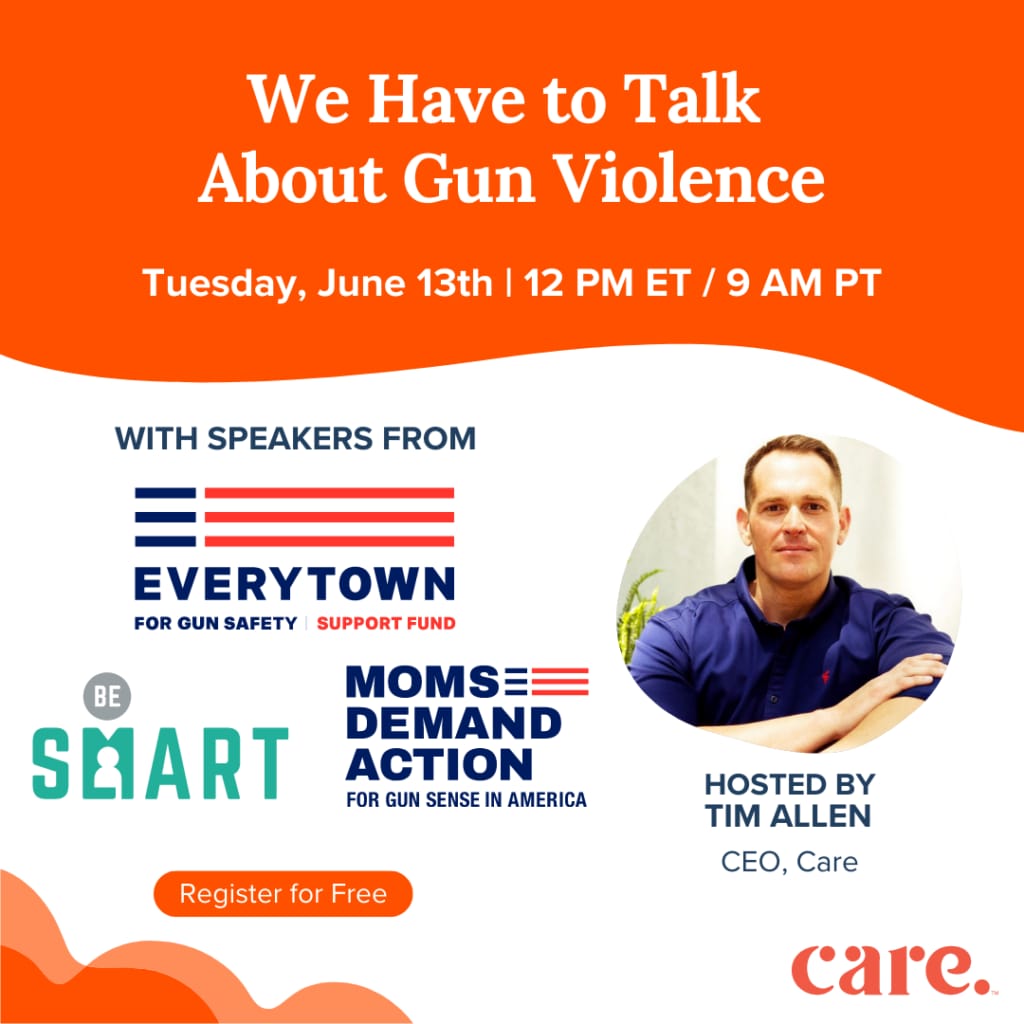In the wake of increasing gun violence in the U.S., gun safety is a common concern for many U.S. workers, and caregivers are not exempt. Forty-five percent of Americans live in a household with at least one gun, which means that many in-home caregivers also work in homes where guns may be present.
If left unsecured, guns can pose a serious risk to both caregivers and the people they care for. In 2023 alone, there have already been more than 500 unintentional shootings nationwide, and experts say talking with current and future employers about guns is fast becoming an essential part of workplace safety.
“Caregivers should have safe working conditions,” says Allison Anderman, Senior Counsel and Director of Local Policy with Giffords Law Center. “When a gun is left unsecured, it could be accessed by a child or teen, someone in the home with dementia or another unauthorized person. Such access poses real risks for caregivers in the home.”
Gun violence impacts people from all walks of life, and conversations about guns at work are just as vital as any other discussion about workplace safety. Here’s how you can easily bring up the topic of guns with current and future employers, and what experts recommend to make sure your gun safety conversations stay positive and productive.
When is the right time to talk about gun safety?
Shannon Parola, a professional nanny and child care coach in San Martin, California, recommends discussing gun safety with employers as early as possible, including asking about weapons in the home during your initial interviews.
“During the interview process, it’s important to be honest about your preferences, especially if you would prefer to work in a gun-free home,” Parola says. “You can ask if there are guns in the house and whether they are securely locked away. How the family responds to this question can give you an idea of whether it’s a concern or not.”
Even if this conversation doesn’t take place right at the start of employment, it’s never too late to bring it up, especially if something changes in the home or you find yourself in an unsafe situation.
“During the interview process, it’s important to be honest about your preferences, especially if you would prefer to work in a gun-free home.”
— SHANNON PAROLA, NANNY AND CHILD CARE COACH IN SAN MARTIN, CALIFORNIA
”If you’re already working with a family and come across a weapon in the home, it’s important to remain professional and prioritize safety,” says Parola. “Depending on your level of comfort, you may choose to carefully remove the weapon from the area or to relocate to a safer space. Afterward, have a conversation about gun safety and how to prevent similar incidents from happening in the future.”
How to talk about gun safety with employers
Because guns are such a politically charged topic, it can feel uncomfortable to ask current or potential employers about weapons they might have in their homes. Here’s how to easily start the conversation and how to work through potential safety issues in a professional way.
1. Keep it simple and straightforward.
Dr. Kelsey Gastineau, a pediatrician, firearm safety advocate and Moms Demand Action volunteer in Nashville, says the best way to ask about guns in the home is to be direct: “Are there guns in the home, and if so, how are those guns secured?”
If you need to start a conversation about an unsecured firearm you came across on the job, explain what happened, and then ask how you can work together to address the situation. While these conversations may feel awkward, Gastineau says to keep in mind that being direct and honest about gun safety is essential to being able to do your job.
“Being entrusted as a caretaker or caregiver is an incredible responsibility, and the only way to fulfill that responsibility is to fully understand the environment and context in which you’re operating,” she says. “Being aware of any firearms in a home or vehicle and how they are secured is a critical component to preventing unnecessary harm from coming to yourself or someone in your care.”
2. Know the laws in your area.
Some US states have specific laws regarding safe firearm storage, and it’s important to familiarize yourself with these laws prior to talking to employers about guns. Knowing what’s required by law can help you frame your conversation and know what options are available to you when it comes to workplace safety.
To learn more about gun laws near you, Anderman recommends visiting Giffords.org to find resources on gun laws state-by-state, though she cautions that websites should never be used in place of legal advice. “You can also contact local law enforcement for questions about gun storage laws,” she adds.
3. Keep the conversation judgment-free.
When you start this conversation with an employer, remember that you’re there to discuss workplace safety, not personal opinions about guns or gun laws. “Owning a gun is a personal decision, but secure storage is a safety issue that can impact others,” says Gastineau.
“When you’re a caregiver, you ask your employer all sorts of questions about managing the person in your care,” she adds. “‘What time is bedtime?’ ‘Do they have any medications, when do they take them and how are they stored?’ Asking about secure storage in the context of other important safety topics can help keep it professional and non-judgmental.”
“Even toddlers are capable of finding unsecured guns at home, and they’re strong enough to pull the trigger. Secure storage means making sure guns are always inaccessible to kids or those who could be a danger to themselves or others.”
— DR. KELSEY GASTINEAU, PEDATRICIAN AND MOMS DEMAND ACTION VOLUNTEER
4. Know the right answers to your questions.
Once you ask questions about gun safety, your employer should be able to answer those questions in a satisfactory way. “A responsible answer would be, ‘Yes, we do have guns. However, they are unloaded and kept in a locked safe in X location,’” notes Parola.
Gastineau stresses that the most effective way to store firearms in a home or vehicle is:
- Unloaded.
- Locked.
- Separate from the ammunition.
“A gun that is ‘hidden’ on a high shelf in a closet, unlocked in a nightstand or tucked under the seat in a car is not securely stored,” she explains. “Even toddlers are capable of finding unsecured guns at home, and they’re strong enough to pull the trigger. Secure storage means making sure guns are always inaccessible to kids or those who could be a danger to themselves or others.”
5. Consider gun safety training.
On the off chance that you do encounter a weapon at work, it may be helpful to have some basic knowledge of gun safety and proper handling, Parola says. Gun safety training typically includes:
- Safe storage practices.
- Instructions for responsible handling.
- How to transport weapons.
“Even if you don’t plan on owning or using a firearm, this certification and knowledge could prove helpful for you and the employer in the future,” Parola says.

Sign up for our free webinar here
What if my employer doesn’t practice gun safety?
Unfortunately, not all gun owners are informed about gun safety or willing to implement safe practices in their homes. If you are in an unsafe situation, here’s what Dr. Gastineau advises:
Discuss the risks of unsecured guns
“I recommend first sharing a little bit about the risks of unsecured firearms for children or other people in your care, and the many ways secure storage can stop tragedy before it strikes,” she says.
BeSMARTforKids.org has a wealth of information about secure firearm storage and why it’s critical to prevent unsafe access to guns.
Propose solutions
Explain how you’d like them to address the problem and ask what they’re willing to do to ensure you feel safe. For example, Gastineau says, “Would they be willing to securely store their gun when you are present in their home? If not, would they be comfortable with you keeping their loved one out of the house during the hours that they’re in your care – maybe going to a park or a movie?”
Be prepared to walk away
“Ultimately, it’s an employer’s responsibility to provide a safe environment for an employee,” Gastineau adds. “If a caregiver feels unsafe, they should consider whether it’s in their best interest to take or continue the job at all.”

